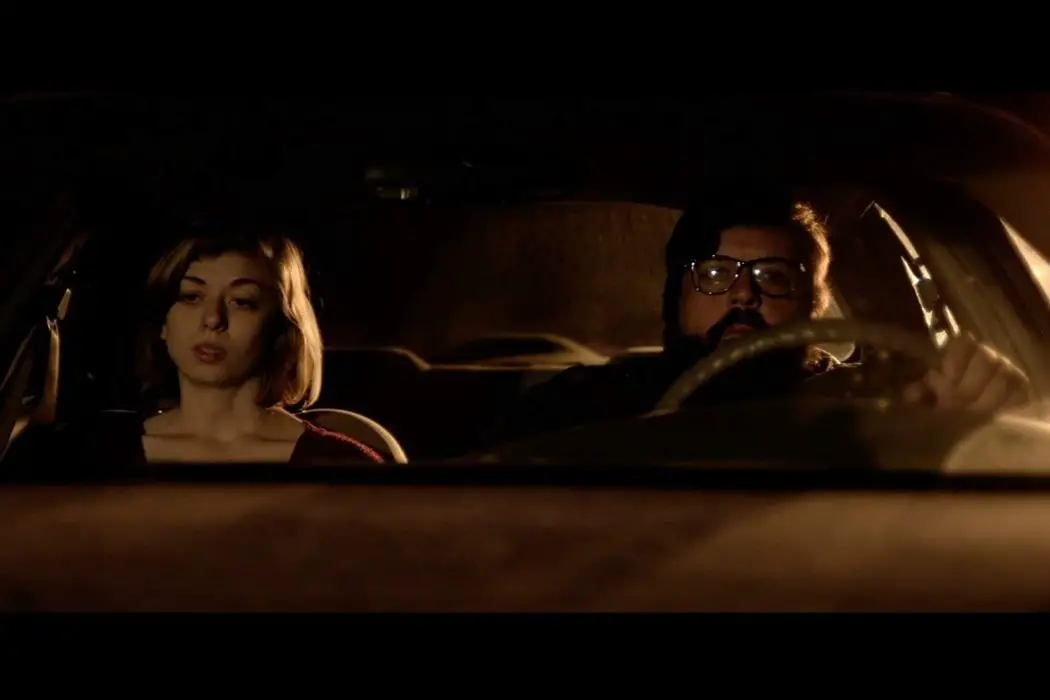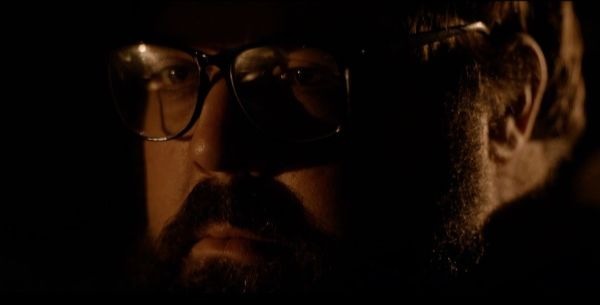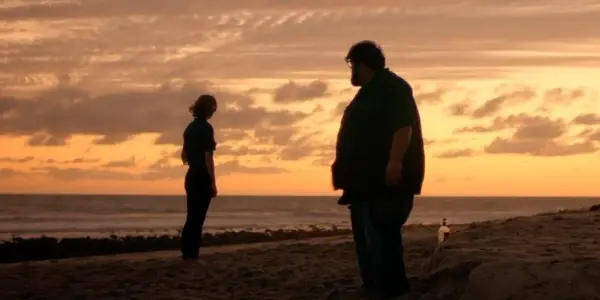WADE IN THE WATER: Artfully Measured Ounces Of Dark Humor & Solemn Drama

Andrew Stover is a film critic/writer from the Chicagoland. His…
Director Mark Wilson and writer Chris Retts pull off something deeply inventive and darkly funny with Wade in the Water. No, it’s not how the popular song came to be, or how the song was musically envisioned through various artists, but its main character might as well be the embodiment of the spiritual song. The song originally relates to the Old and New Testaments, lyrically reflecting the Israelites’ escape out of Egypt as found in Exodus.
Slaves utilized the song as instructions to follow the route to freedom. This immediately leaves me asking this specific question about our enigmatic lead character (whose name is never once said): can he ever escape the past and find comfort in doing the unthinkable, or is he always going to be drowning in rough waters, unable to surface and sustain ground in reality?
Wade in the Water is a blunt and forbidding drama more of a dark comedy, exploring conceits and concepts spun in controversial threads. And it’s because of Tom E. Nicholson’s remarkable performance that the familiar storytelling ingredients mesh together in disquieting ways. Our man (Nicholson) is obese and lives alone. He’s able to work from home as a medical bill collector, but he also has no friends and social life. He lashes out when his order at a fast food place is wrong, he despises his ear-splitting neighbors who are heard through the walls, he has no desire to eat the veggies he keeps concealed in the fridge, and he spends the majority of his free time watching classic movies on his quaint television box.

Our man is tetchy and inhibited, but he finds his monotonous life turned upside down when the wrong package is delivered to him, containing a disk riddled with photos of exposed children. This drives him on the path for vengeance, scoping out the post office to smoke out the sick mind behind the photos. When the man responsible for the photos is revealed, all it takes is one google search to steer the main character to buy a gun, a mask and procure a sudden dose of vexation and power to eradicate the odious soul. Along the way, our man meets teenager and aspiring writer Tilly (Danika Golombek), who happens to be the daughter of the pedophile, so imagine what must occur between our man and Tilly: a complicated friendship.
A Riveting Perspective, Tailored In Crippling Morality And Desire
Embedded in indie roots and contentious in its own right, Wilson deploys the main character in a story infused with immorality and clashing perspectives but does so in a subtle and softly potent fashion. The opening scene highlights a brooding, fuming and portly man, using the camera to follow him from behind. He puts on a mask and picks up a gun, walking toward a door, locked and loaded. But a scene shift takes us to a post office, where the camera zooms out on a bunch of P.O. boxes, centering the box numbered 1983.
A man arrives within the frame to open box 1983. Clearly, this is the same man we just saw with a gun in the inky and ominous opening shot. But Wilson plants that seed of intrigue and consternation, bestowing viewers with a sense that this man, who is now arguing with a P.O. employee about wanting to buy just one stamp (yet they only sell them in packs), will significantly crack.
Obviously, we don’t know what will cause him to crack just yet. We just know that he has a temper and a past, which is made more clear once he’s in a therapy session. The therapist (Sheila Mears) is probing the guy, trying to exhume the eternal anguish rendered by his father’s ineffaceable abuse. Our man remains reticent and reserved, however, still not confident enough to articulate his feelings about the abuse.
In order to envision what it’s like to feel ensnared in one’s misfortunes, not able to face them directly, the camera mainly captures the man on the side or when he’s slightly looking away, employing a static or close-up shot to confine the character in his own dour shell. Nicholson manages to exude palpable dejection and penitence by preserving his character’s ill-mannered attitude and upholding a face drawn in salient pain. He barely says a word, but when he does, he reacts in a vitriolic fashion.
So when he gets the wrong package delivered to him, which contains a disk filled with explicit and repulsive photos of exposed children (no, these photos are not shown, but a reaction shot highlights a disgusted and genuinely fearful Nicholson), this is what makes him dangerously vexed. For twenty minutes or so, our ill-defined protagonist is bitter, but he’s also appealing. Patently, he finds his life dull and his past imperishable, so when this revolting package is wrongly distributed to our man, he gets caught under the weight of wrath, disgust, and justice. He starts scouting the post office to unveil the one behind the disk and discovers it’s a preacher, who was able to get away with a pedophilia crime years ago unscathed.

At this point, he’s still in accordance with the law, trying to get the victim to speak up against the preacher, but the family and the victim have moved on. And since the preacher is living life while still acting on these abominable desires, our lead character decides to take matters into his own hands. Nicholson’s character is one of the most intriguing, layered and morally intricate characters you’ll ever see in cinema this year (that’s if anybody’s able to see it).
Not only is his character emitting this tactile agony and rancor, triggered by his past (which I’ll keep concealed for the sake of conserving the sheer cruelty of the abuse), but his character’s collapse into violence is harshly authentic and acutely tangled (the preacher’s death is seen from outside, as we’re looking through a glass window, seeing him shoot the gun and hearing the gunshot, but unable to view the body).
Our man murders the preacher, further outlining a perspective once laced in monotony, not corrupted with violence. Guilt inevitably plagues the man, and he knows his morality is draining (after prompting a hideous death, his face radiates even more desolation and guilt), but he still continues on with his life. He apologizes to the employee at the fast food joint, he keeps his day job and he persists on watching classic movies.
But a little part of him is still petrified of being caught and going to jail, so he goes back to the preacher’s house, only to gain the suspicion of the preacher’s daughter, Tilly. Despite already showing implications of dark comedy, Tilly’s presence sketches an unorthodox friendship, functioning riotously and empathetically.
“I Wanna Be A Good Person Too. What Should I Do?”
The developing friendship between our man and Tilly is by far the most diverting aspect of the movie. Commonly, Tilly should be fueled by resentment and anger for our man’s murderous actions, but she simply leaves a note on the hood of his car, asking for a moment of his time to discuss whether or not she feels the need to turn him in. The first half of the picture was all about following our troubled protagonist until finally being pushed to the edge. The second half, on the other hand, is showcasing the eccentric and involuted relationship between our man and Tilly. Upheld by superb dialogue and chemistry, Nicholson and Golombek give impressive performances that persuade viewers of their odd friendship appeal.
Tilly wants to be a writer, and despite cognizing her father’s turpitude, she does miss him. But she doesn’t cry; she never cried. Tilly finds herself hanging out with the man who killed her father. Yep, but she’s able to open up about her grief — which is measured differently because she doesn’t cry, and she does weather conflicting feelings about her father’s death because he was a pedophile, even if he didn’t touch her. Our man is eventually able to open up about his father’s abuse because of Tilly’s ceaseless probing. Sure, there are obstacles that get in the way of their friendship, but their chemistry is persistently amusing and emotionally resonant.
Undoubtedly, not many viewers can relate to our man’s murderous activities or even Tilly’s responses while in grief, but at one point in our lives, we felt alone or were left yearning to grasp value in our lives — what can we do to seek self-fulfillment? What will give us life? Throughout the first half, the lead character is set on taking a depraved life for the cause of his new ambition; it’s a purpose, steered by the sheer fact that the preacher is a pedophile and he has the upper hand in killing him where he least expects it.

In the long run, our man admits, “I killed him because I wanted too.” Our man believed he could secure an ounce of freedom or meaning in his rather bleak and tedious life. This devilish preacher gave our man a purpose or more of a specious purpose to murder a man who deserves death. But did he? Did he deserve a bullet in between the eyes? In this case, no. Our protagonist wants to do good, and although we already know he hasn’t done good, Tilly is the one that brings him back from the dark corner he’s been mired in for some time.
We all need people in our lives. We all need that voice to condemn our misleadingly bold or falsely heroic actions, so we can do something to fix them, or at the very least, contain the aftermath. Mistakes and harebrained reactions in life are inexorable, it’s how we deal with the outcome of these unsavory situations that deeply matters. The conclusion brilliantly envisages this idea, but I’m gonna keep my mouth shut.
Personally, I think a few more scenes establishing their connection could have worked in the film’s favor, but what Wilson is able to accomplish in such a limited runtime is nothing short of amazing. Our man and Tilly’s friendship is too weirdly endearing to wholly expound in words, hence why Wade in the Water merits a broader audience. Although I do recognize how unconventional and brazenly brusque this movie is when handling topics of murder, pedophilia, and abuse. It’s harsh and raw, supplying dialogue that’s most likely too forthright for Hollywood, but in film, it’s all about truth, and Wade in the Water speaks grating verities.
Wade In The Water Surfaces As An Emotionally Vigorous Drama
Wade in the Water embraces a character that has a harrowing past and an uncertain future. His name is concealed, he committed a crime and he’s incredibly coarse and uninviting, reluctant to let anyone in, but this is what makes the character engagingly involved. Nicholson and Golombek give impeccable performances capable of entangling dark humor and solemn distress. Wade in the Water tinkers with Thomas Rose’s intimate cinematography (arranged in crooked close-up shots) and Jacob Boyd’s fitting score (engendering the mood of a scene deftly) to uphold the tension and uncertainty of the characters actions, but it’s the emotion that lingers further and louder than any anticipated gunshot.
The examination of murder, pedophilia and unspeakable abuse, are jarring topics, but Wade in the Water isn’t lurid or inflated. Wilson’s execution is serene and artful, employing the camera and Rett’s terse script to preserve a perspective brimming with enticing character defects. Wade in the Water emerges from indie roots, inheriting a vague future, but make no mistake, it cultivates a lot of screwy laughs, a lot of suspense and a lot of truth.
What is your favorite dark comedy, which also interlaces violence and bleak subject matter? Let us know in the comments!
Wade in the Water made its premiere at the Hollywood Reel Independent Film Festival February 16, 2019, and is set to premiere again at Dances with Films Festival June 19, 2019. Theatrical and digital release is unknown at this time.
Does content like this matter to you?
Become a Member and support film journalism. Unlock access to all of Film Inquiry`s great articles. Join a community of like-minded readers who are passionate about cinema - get access to our private members Network, give back to independent filmmakers, and more.
Andrew Stover is a film critic/writer from the Chicagoland. His film & TV reviews can be found on Film Inquiry & Film Threat.













